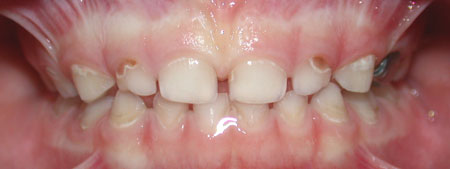
Have you heard of “baby bottle tooth decay” or “bottle rot”? Parents know they don’t want their children to have it, but many don’t know how it happens or what they can do to prevent it.
Baby teeth, even when they first arrive in the mouth, are susceptible to tooth decay. It is important to protect these teeth from decay so a child’s smile will look good, feel good and function properly. The baby teeth are essential for eating, speech development, holding space for adult teeth and of course, smiling.
When young children drink from a bottle or nurse from their mothers, their teeth are at risk for decay. Frequent, prolonged feedings present the greatest risk for these young teeth. If children are drinking sugary drinks such as juice or chocolate milk, the risk increases. The risk increases further when children are put to bed with a bottle or when a bottle is used to pacify a fussy child.
Tooth decay is a disease that can begin with cavity-causing bacteria being passed from the mother (or primary caregiver) to the infant. These bacteria are passed through the saliva. When the mother puts the baby’s feeding spoon in her mouth, or cleans a pacifier in her mouth, the bacteria can be passed to the baby. Always wash utensils and pacifiers with water before passing them to a child.
Some tips for avoiding baby bottle tooth decay:
- Do not share saliva with your baby. Never lick spoons, bottles or pacifiers before passing them to your child. You may be passing cavity causing bacteria without even realizing it.
- Begin cleaning the mouth before teeth even arrive. You can wipe your child’s gums with a damp cloth after each feeding. In addition to keeping the mouth clean, this practice allows the child to grow accustomed to the routine of cleaning the mouth.
- As soon as teeth erupt, brush them twice daily with a toothbrush and a smear of a fluoride containing toothpaste. Your child should not exclusively brush independently until approximately age 7 or 8.
- Avoid placing juice, chocolate milk, flavored water or soft drinks in bottles. Give only formula, milk or breast milk in bottles.
- Child should never go to sleep with a bottle or cup in their mouth. After finishing the bottle or cup, try to clean the teeth or even have the child drink some water wash away any residual milk.
- Try to eliminate the bottle around the first birthday.
If you have questions about caring for your young child’s teeth or you suspect your child may have baby bottle tooth decay, schedule an appointment today.
Adapted from MouthHealthy and the American Dental Association.
ShareJUL
2014

About the Author:
Since 1972, Salem Pediatric Dental & Orthodontic Associates has provided comprehensive preventive and therapeutic oral health care for infants and children through adolescence including those with special health care needs. We proudly serve the communities of Salem, Lynn, Peabody, Danvers, Marblehead, Swampscott, Beverly, and many more.